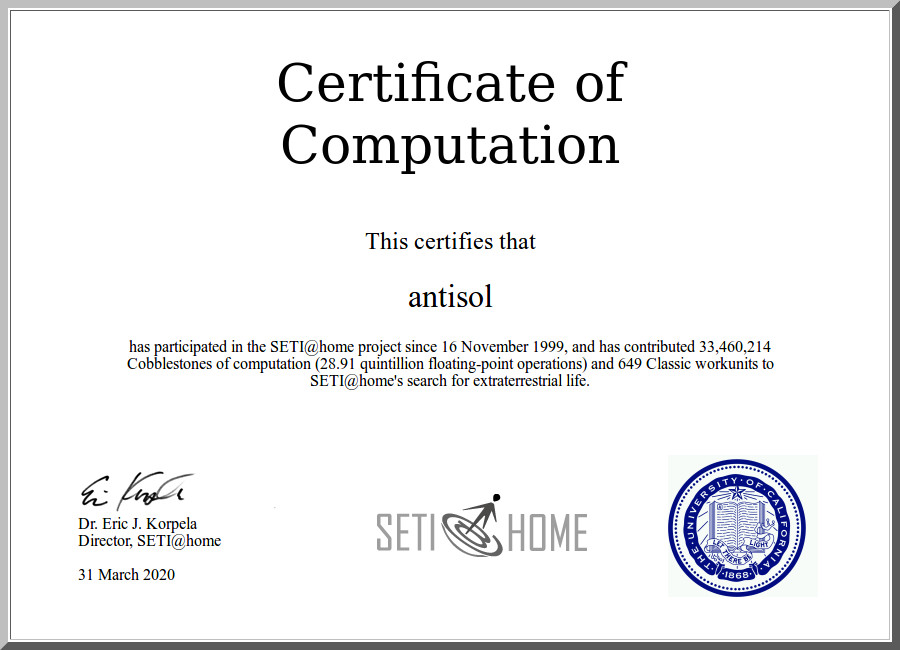In the next day or so, the seti@home project goes into “hibernation”.
I’ve been contributing my spare CPU time to this project for over 20 years. More than half my life. A whole bunch of posts on this blog are about seti@home milestones.
I’m pretty avid about it, because I think that SETI is probably the single most important bit of science we can be doing. That’s a whole discussion, perhaps for another day.
I keep track of the statistics on an irregular basis. I contribute as much as possible, including donating CPU time of servers and workstations I control.
I’m the number 49 contributor in the country. I’m glad that I managed to crack the top 50 (this happened fairly recently) before the project shut down.
I also managed to crack the 99.9th percentile – I’ve accumulated more credit than 99.90051% of all SETI@Home Users. This is also a fairly recent development. I’m also glad that I managed to crack three-nines before the project shut down.
I’m ranked 1,797 out of 1,806,205 in the world.
I’ve contributed 28.91 quintillion floating-point operations:

Suffice to say that it’s something that I’m passionate about. My Drake Equation simulator is an example of that.
I’m… displeased… by this development.
The announcement that the project is going into “hibernation” came less than a month ago. Here’s the stated reasons:
We’re doing this for two reasons:
1) Scientifically, we’re at the point of diminishing returns; basically, we’ve analyzed all the data we need for now.
2) It’s a lot of work for us to manage the distributed processing of data. We need to focus on completing the back-end analysis of the results we already have, and writing this up in a scientific journal paper.
With regard to point one: My drake equation simulator, and common sense, tells me one thing about SETI: it’s a long-haul game. Given the size of the galaxy and the delays in communication between stars, any communication with extraterrestrial intelligence is going to be a slow process. Another important factor is that given the size of the galaxy, if an alien civilization starts broadcasting today, the likelihood is that it’s going to be thousands of years – perhaps even a hundred thousand – before we receive that transmission. And that’s only taking civilisations in our galaxy into account. The SETI project might run for hundreds of years and not find anything. And it should. A couple of decades for a project like this is an infinitesimal blip compared with the timespans we’re talking about with regard to extraterrestrial intelligence. If you’re going to make the claim that “we’ve analyzed all the data we need for now”, then that can only mean one of two possibilities: 1: You’re not actually doing SETI, or 2: you don’t know what the fuck you’re talking about. There is new data coming in every second of every day. That first signal we detect could be tomorrow. Or it could be a thousand years from now. If we stop looking it’ll be never.
Some fuckwitspeople argue that running a project like SETI is expensiveblah blah blah. They seem to think that because we haven’t found anything in a few decades (well, nothing definite – we have found a couple of interesting and unexplained signals, the Wow! Signal being the most famous) that we should save our money and give up. This is ludicrously short-sighted thinking. The SETI project needs to be a LONG-term project. In the hundreds or thousands of years. It’ll take a hundred thousand years of SETI before we can say that we’re (probably) the only intelligence in the galaxy, and even then we could get a signal the next day. And no result is a result where SETI is concerned – not getting signals gives us some indication of the rarity of intelligence (or, at least, EM radio tech) in the galaxy.
As for point two, this basically boils down to “we’ve decided we can’t be bothered”. If it’s a lot of work then that means you haven’t automated it properly. Writing this up as a paper? What I’m hearing is “it’s more important that I get published than answering one of the most important and fundamental questions out there”. I’ll be expecting to see my name attributed on the paper.
There are nearly 2 million seti@home users. Lots of us are computer nerds. I’m sure you could have found some volunteers to do all that hard work you can’t be bothered with any more. I’d be happy to do as much as I can. But you didn’t ask, instead you just shut down a project that I’ve been invested in for most of my lifetime.
Obviously, seti@home isn’t all of SETI, obviously there will be a bunch of other SETI being done. The Breakthrough listen project is doing some great stuff. But this is a blow to science. Seti@home was a pioneer of distributed computing. And I think that the way it’s being shut down is a huge disservice to science and to all the people who have volunteered our processor time and electricity over the decades. I’m not impressed.
My machines, on the other hand, will be relieved. Their processors will be running much cooler from now on. I’ll go through processor fans much less quickly. And my wallet will probably appreciate the reduction in electricity consumption: I’ll be interested to see the difference in my power bill. I wouldn’t be surprised if it’s noticeable.